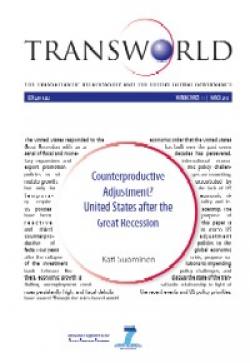Counterproductive Adjustment? United States after the Great Recession
The United States responded to the Great Recession with an arsenal of fiscal and monetary expansions and export promotion policies to stimulate growth, but only for temporary respite. US policies have been reactive and risked counterproductive effects. Four years after the collapse of the investment bank Lehman Brothers, economic growth is flailing, unemployment continues persistently high, and fiscal deficits have soared. Though the rules-based world economic order that the United States has built over the past seven decades has persevered, international economic policy challenges are mounting, exacerbated by the lack of US economic vitality and leadership. The purpose of this paper is to assess US adjustment policies to the global economic crisis, propose solutions to impending policy challenges, and discuss the state of the transatlantic relationship in light of the recent events and US policy priorities.
Documento prodotto nell'ambito del progetto IAI Transworld.
-
Dati bibliografici
Roma, Istituto affari internazionali, 2013, 23 p. -
Numero
11
Introduction
World's Economic Engine
The Crash and Its Causes
US Responses to the Crisis
Monetary Policy: Dilemmas and Unintended Consequences
Fiscal Quicksand
Trade Policy: Growth through Exports
Regulatory Clampdown
Withering International Leadership
Toward a New Growth Model? Challenges to US Growth in the Post-Crisis World
Fiscal Policy Dilemma
Productivity Gap
Upholding the Global Order
Not All Is Wrong: Strong Fundamentals
Transatlantic Relationship in the Post-Crisis World
Conclusion
References




